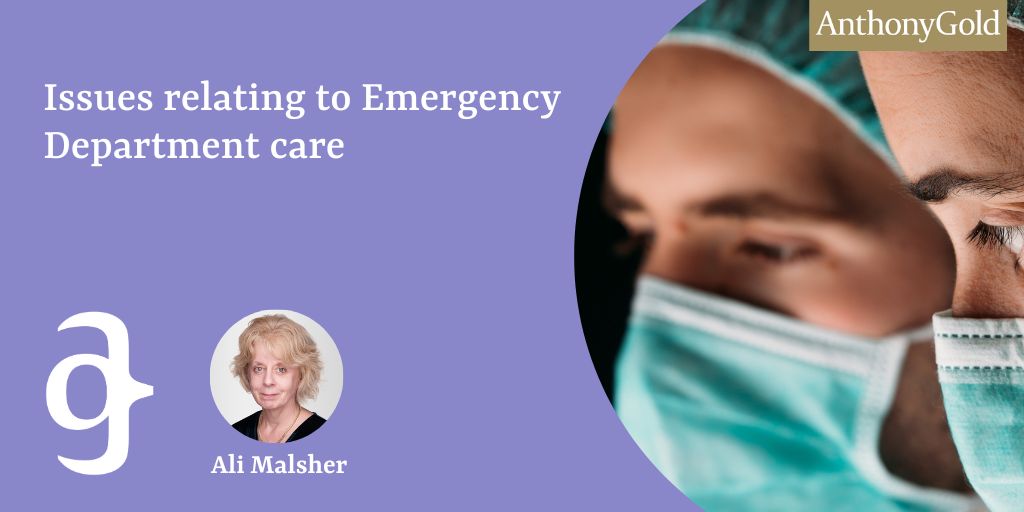Issues relating to Emergency Department care

Recently NHS Resolution held a significant conference into the issues relating to Emergency Department (ED) care. The purpose of the conference was to share insights into reducing claims in emergency medicine. It concentrated in essence on three areas namely:
- High value and fatality-related claims;
- Missed fractures, and
- Hospital pressure ulcers and falls.
The purpose of the conference, its aims and practice can only be applauded. Anything that improves the safety and ultimate functioning of an emergency department has to have support.
Repeated attendance
It was interesting to note that amongst the issues in relation to high-value and fatality-related claims were the issues of repeat attendance.
All clinical negligence claim lawyers dealing with a variety of claims, many involving life-changing conditions, will have come across cases where there have been repeat attendances of a patient with the same problem often in a short space of time. The claimant generally has been seen by a variety of different individuals at different levels and a diagnosis missed and/or treatment has not been instituted appropriately.
I have represented several clients where they have attended hospital with what ultimately were diagnosed as significant and urgent vascular problems of the lower limb, to find that they have been essentially discharged by the non-urgent out of hours GP element of the ED, fairly junior doctors in the ED or occasionally, a combination of the two. Sometimes a failure of communication (usually IT) or sometimes a lack of appreciation of the significance of someone attending again despite being told there isn’t a real problem is to blame. Generally people do not attend and wait for hours if they are unconcerned about their health and to attend on more than one occasion at least implies that they are anxious perhaps with good reason.
One of the recommendations that came from the review by NHS Resolution was that there should be a recognition of the importance and risks associated with repeat attendance and a need for systems to ensure access to senior clinical review.
Likewise, there should be an agreed pathway for patients that reattend the emergency department on a number of occasions with the same condition to ensure that a senior level clinical review takes place.
This has to be supported and implemented.
Many of the vascular cases with which I deal have attended emergency departments on a number of occasions with pain and coldness in their limbs without necessarily a referral to a vascular specialist or even a review by a senior clinician in the emergency department. In a recent case, the client attended on three consecutive days in March by which time the matter was urgent, and he was ultimately transferred through to a London-based hospital for what finally became an amputation.
In the same way that repeat complaints to a GP are always potential red flags in terms of failure to provide care so it is with the emergency department where patients may be accessing the hospital system for the first time and often without knowledge or support from the GP.
Medical notes
Part of the problem traditionally was that although medical records were completed on each attendance if there were for example some errors in noting down date of birth or full name of the claimant often different numbers were prescribed and the system had difficulty in bringing up the notes from previous attendances. Emergency department notes often have completely different references to those of standard medical records and though the system is supposed to bring the two together it often does not.
A lay claimant may not provide a complete and detailed history (understandably) it can be difficult for clinicians to ascertain what has happened. Nonetheless, it is hugely important that if a claimant reports that they have attended the emergency department previously, particularly in recent times with the same condition that a more senior clinician ultimately reviews the decision to discharge (if appropriate) or to refer.
NHS Resolution have made a significant contribution to the discussion about care in emergency departments but recommendations are only helpful if they are implemented. It is to be hoped that the providers of ED services will implement the recommendations and agreed pathways. It is to be hoped that claimant lawyers will note that there should be a pathway for these claimants and patients and seek details of that when they are looking for disclosure or documents.
Pathways and protocols
There are an increasing number of pathways and protocols being put in place in hospitals to deal with possible adverse events and pathways to more senior clinicians should be part of the request for and provision of standard disclosure. It is to be hoped that these recommendations will be put in place as quickly as possible. It is to be hoped that the medical and nursing professions recognise the potential importance of the patient who re-attends with the same condition despite assurances or review in recent times. Often patients do not know the full significance of symptoms but they do know when they do not feel well or something feels unusual. Repeat attenders are taking that message to the EDs and it is for the medical and nursing professions to hear.
It is possible it could result in the number of adverse events reducing significantly. That has to be a good thing for everyone, not least the patients.
* Disclaimer: The information on the Anthony Gold website is for general information only and reflects the position at the date of publication. It does not constitute legal advice and should not be treated as such. It is provided without any representations or warranties, express or implied.*
No comments